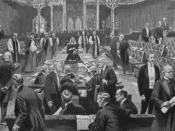In order to advise Glamix Limited on the issues raised it is necessary to discuss the following areas of law: (a) passing off, and (b) trademarks.
(a) The common law tort of passing off enables enterprises to protect their trade symbols. The passing off action may apply in situations where trademark protection does not apply. This is a significant point as Glamix does not have any registered trademarks. The concept of passing off was established in the case Perry v Truefitt,[1] in which Lord Langdale MR ruled that a trader 'is not to sell his own goods under the pretence that they are the goods of another man.'[2] The action enables 'trader A to prevent a competitor B from passing their goods off as if they were A's.'[3] The key component of this wrong is telling lies to the public.
It has been identified that the law 'contains sufficient hooks and crannies that make it difficult to formulate any satisfactory definition [of passing off] in short form.'[4]
However recent authoritative statements of the law on passing off can be found in two House of Lords decisions: Warnink v Townend[5] ('Advocaat'), and Reckitt & Colman v Bordern[6] ('Jif Lemon'). Although the two cases offer different terms[7] of passing off, a general statement can be formulated consisting of the elements of the action. In order to succeed in an action for passing off the claimant (Glamix) must establish: '(i) that the claimant has 'goodwill', (ii) the defendant made a 'misrepresentation' that is likely to deceive the public', and (iii) the misrepresentation damages the goodwill of the claimant.'[8] Glamix is required to show that each of elements of the classic trinity existed at the time they suspect the passing off occurred.
The first element that needs to be established in a claim...


